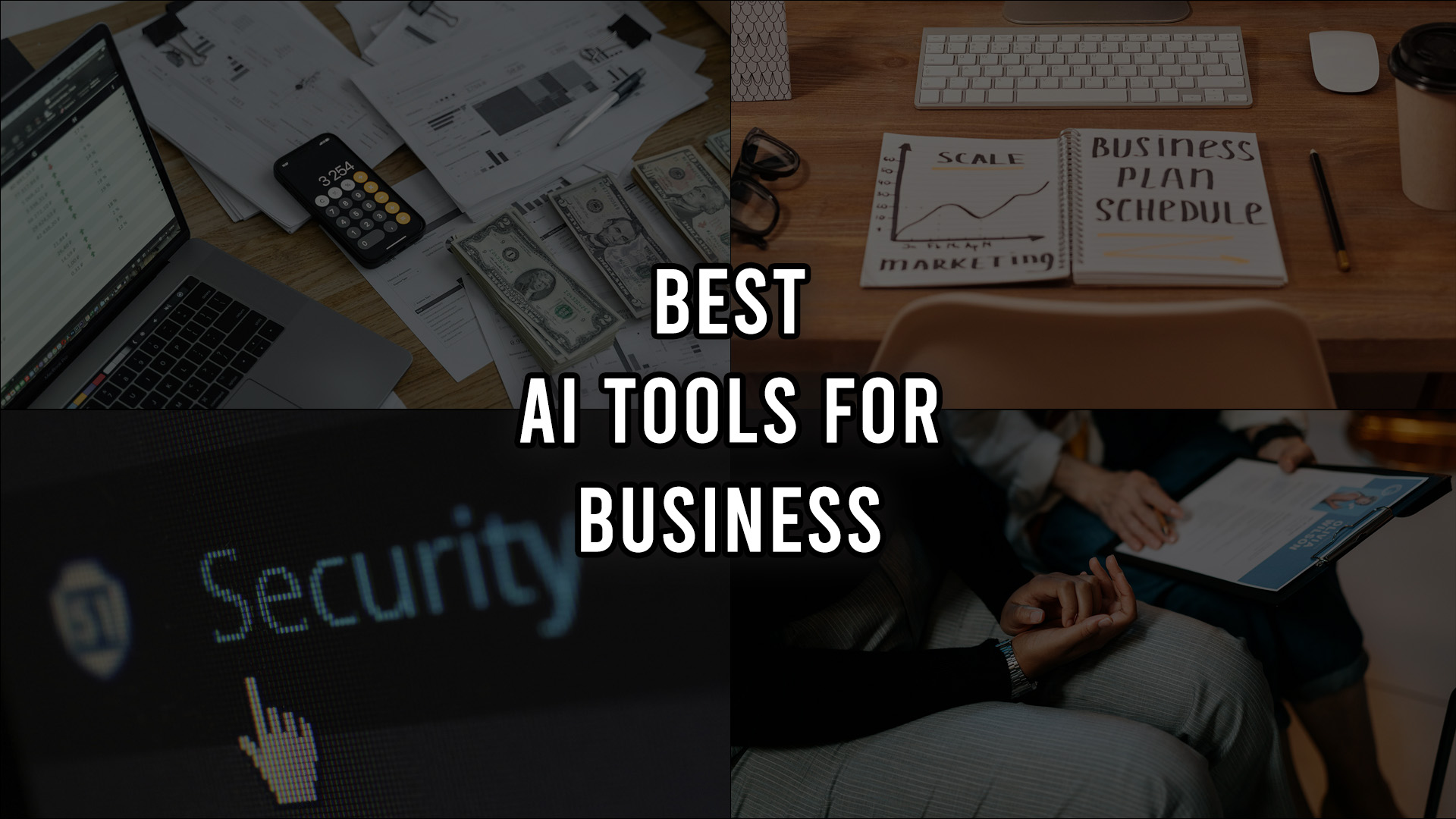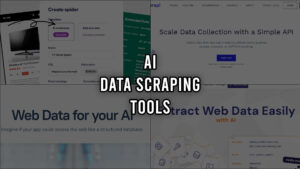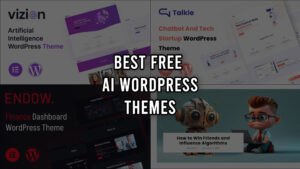The business landscape is rapidly transforming, and Artificial Intelligence (AI) is at the forefront of this change using Best AI Tools for Business. Businesses of all sizes are recognizing the immense potential of AI to improve efficiency, make smarter decisions, and unlock new levels of creativity.
This blog post delves into the best AI tools for business, categorized by their functionalities to empower you to find the perfect AI partner for your specific needs.
AI Customer Relationship Management (CRM) Tools
Traditionally, CRM systems have been valuable tools for managing customer interactions. But the integration of AI takes them to a whole new level. AI-powered CRM tools can analyze customer data to identify buying patterns, predict future needs, and personalize marketing campaigns.

Popular options include industry leaders like Salesforce Einstein and HubSpot with their robust AI features. These best ai tools for business analyst can automate tasks like lead scoring and customer segmentation, allowing your team to focus on building strong customer relationships.
Learn: Top Free AI Tools: A Comprehensive Guide
AI Face-Off: Salesforce Einstein vs. HubSpot
| Feature | Salesforce Einstein | HubSpot AI |
|---|---|---|
| Target User | Large businesses, Data-driven companies | Small & Medium Businesses, Marketing-focused companies |
| CRM Integration | Deep integration with Salesforce CRM | Offers basic CRM features, but not as comprehensive as Salesforce |
| Strengths | Predictive Analytics, Lead Scoring, Opportunity Prioritization, Customization | Content Creation, Marketing Automation, Lead Nurturing, User-friendly interface |
| Weaknesses | Steeper Learning Curve, Expensive (add-on to Salesforce), Limited Marketing Focus | Less Customization, Limited CRM Functionality, Limited Sales Features |
| Pricing | Varies based on Salesforce CRM plan (typically expensive) | Freemium plan available, Paid plans for advanced features |
| Best For | Complex CRM needs, Advanced sales forecasting, Businesses with a dedicated IT team | User-friendly marketing automation, Content creation, Startups & small businesses |
AI-Powered Analytics and Business Intelligence Tools
Data is the lifeblood of any successful business, but without proper analysis, it remains just numbers. AI-powered analytics and business intelligence tools can unlock the hidden insights within your data, empowering you to make informed decisions.

Tableau, Power BI, and Google Analytics are some of the leading AI-driven analytics tools. These platforms can analyze vast datasets from various sources, identify trends, and generate insightful reports, allowing you to gain a deeper understanding of your customer base, market trends, and overall business performance.
Unveiling the Data: A Comparison of Tableau, Power BI, and Google Analytics
In today’s data-driven world, business intelligence (BI) tools are essential for making informed decisions. Here’s a breakdown of three popular options: Tableau, Power BI, and Google Analytics, to help you choose the right fit for your needs:
| Feature | Tableau | Power BI | Google Analytics |
|---|---|---|---|
| Target Audience | Data analysts, business users | Business analysts, data analysts | Website owners, marketers |
| Pricing | Varies based on version (paid) | Freemium plan available, paid plans for advanced features | Free |
| Strengths | Exceptional data visualization, powerful data manipulation | User-friendly interface, tight integration with Microsoft products | Easy to set up, tracks website traffic and user behavior |
| Best For | Creating interactive dashboards and reports for in-depth analysis | Quickly visualizing data and sharing insights within a team | Understanding website performance and user engagement |
| AI Features | Predictive analytics (limited), data clustering | AI-powered insights and recommendations | Smart Goals, audience insights |
The best AI Tools for Business depends on your specific needs and budget. Consider the level of data analysis required, user experience preferences, and budget constraints when making your decision.
AI-Powered Marketing Tools
Marketing campaigns can be complex and time-consuming. AI-powered marketing tools can streamline these efforts and maximize your return on investment (ROI).

Marketo, Mailchimp, and AdRoll are just a few examples of AI-powered marketing tools that can automate tasks like email marketing, social media scheduling, and ad campaign optimization. These tools can also leverage AI to personalize marketing content and target the right audience for maximum impact.
Best AI Marketing Tools Compared: Marketo, Mailchimp, and AdRoll
Here’s a quick comparison of three popular AI marketing tools: Marketo, Mailchimp, and AdRoll:
| Feature | Marketo | Mailchimp | AdRoll |
|---|---|---|---|
| Target Audience | Large Businesses, Enterprises | Small Businesses, Startups | Ecommerce Businesses |
| Pricing | More expensive (typically requires quote) | Affordable, freemium plan available | Varies based on campaign budget |
| Strengths | Powerful marketing automation, lead scoring, analytics | User-friendly interface, email marketing, landing pages | Retargeting ads, multi-channel marketing |
| Best For | Streamlining complex marketing campaigns, nurturing leads | Sending basic email campaigns, managing email lists | Running targeted ad campaigns to website visitors |
| AI Features | Lead scoring, personalized content, campaign optimization | Audience segmentation, email recommendations | Dynamic product ads, retargeting based on browsing behavior |
AI-Powered Virtual Assistants and Chatbots
Imagine having a tireless and helpful assistant available 24/7! AI-powered virtual assistants and chatbots can revolutionize your customer service and support. Tools like Chatfuel, ManyChat, and Zendesk allow you to implement AI chatbots that can answer frequently asked questions, schedule appointments, and even handle basic customer inquiries, freeing up your team to focus on more complex issues.

Chatbot Showdown: Chatfuel vs. ManyChat vs. Zendesk
In today’s digital world, chatbots are becoming essential tools for businesses to engage with customers and streamline communication. But with so many options available, choosing the right chatbot platform can be tricky. Here’s a breakdown of three popular contenders: Chatfuel, ManyChat, and Zendesk, to help you pick the champion for your needs.
| Feature | Chatfuel | ManyChat | Zendesk |
|---|---|---|---|
| Target Audience | Small & Medium Businesses, Marketing Teams | Small & Medium Businesses, Social Media Teams | Large Businesses, Enterprise Companies |
| Pricing | Freemium plan, Paid plans for advanced features | Freemium plan, Paid plans for advanced features | Paid plans only |
| Strengths | Easy to use, Open-source code access, Facebook Messenger focus | Powerful marketing automation, Facebook Comments tool, Multi-channel support | Robust customer service features, Agent collaboration tools, Ticketing system |
| Weaknesses | Limited live chat functionality, Less robust analytics | Steeper learning curve compared to Chatfuel, Limited free plan features | Less user-friendly interface compared to Chatfuel & ManyChat, Primarily focused on customer service |
| Best For | Building simple, Facebook Messenger-focused chatbots | Marketing automation, Social media engagement, Multi-channel chatbot experiences | Complex customer service workflows, Agent collaboration, Enterprise-level needs |
There’s no one-size-fits-all answer when it comes to chatbots. Consider your budget, team’s technical skills, and primary focus (marketing, customer service, or both) to identify the platform that best aligns with your needs.
AI-Powered Sales Tools
The sales process can be highly competitive. AI-powered sales tools can give your team a significant edge. Tools like Gong, Outreach, and SalesLoft use AI to analyze sales calls, identify coaching opportunities, and predict deal outcomes. By leveraging these insights, your sales team can close deals faster and improve overall revenue generation.

Sales Tech Smackdown: Gong vs. Outreach vs. SalesLoft
The sales battlefield is fierce, and the right tools can give your team a competitive edge. But with so many options, choosing the perfect sales enablement platform can be a challenge. Let’s compare three powerhouses – Gong, Outreach, and SalesLoft – to help you pick the champion for your sales squad.
| Feature | Gong | Outreach | SalesLoft |
|---|---|---|---|
| Primary Focus | Call Analytics & Conversation Intelligence | Email Automation & Cadence Management | Email Automation & Sequence Building |
| Strengths | AI-powered insights from calls, Coaching & Development tools, Deal intelligence | Powerful email automation features, Multi-channel outreach, Opportunity management | User-friendly interface, Robust reporting & analytics, Customizable workflows |
| Weaknesses | Limited email automation features, Pricing based on usage (can be expensive for high-volume teams) | Less focus on call analysis compared to Gong, Steeper learning curve for advanced features | Less emphasis on conversation intelligence, Primarily focused on email outreach |
| Pricing | Varies based on usage & features | Paid plans only | Paid plans only |
| Best For | Sales teams heavily reliant on phone calls, Organizations prioritizing coaching & development | Teams prioritizing email automation and multi-channel outreach | Sales teams value user-friendliness and detailed reporting |
The best AI tools for business in this category depends on your specific needs. Consider your team’s communication style, sales process, and budget when making your decision. Do your salespeople spend more time on calls or emails? Do you prioritize coaching through call analysis or streamlined email outreach? Answering these questions will help you identify the platform that best empowers your sales team for success.
AI-Powered Cybersecurity Tools
Cybersecurity threats are a constant concern for businesses of all sizes. AI-powered cybersecurity tools can play a crucial role in protecting your valuable data and systems. Darktrace, Cylance, and SentinelOne are some of the leading AI-driven cybersecurity solutions. These tools can detect anomalies in real-time, identify potential security breaches, and take preventative measures to safeguard your business from cyberattacks.

Cybersecurity Champions: Darktrace vs. Cylance vs. SentinelOne
The ever-evolving cybersecurity landscape demands powerful tools to protect your business. But with so many options, choosing the right endpoint security solution can be daunting. Here’s a breakdown of three leading contenders – Darktrace, Cylance, and SentinelOne – to help you pick the perfect shield for your organization.
| Feature | Darktrace | Cylance | SentinelOne |
|---|---|---|---|
| Security Approach | Threat Detection & Response (AI-powered) | AI-powered Endpoint Protection & Prevention | Next-Gen Endpoint Protection & Response (XDR) |
| Strengths | Uncovers hidden threats, Autonomous response capabilities, Advanced anomaly detection | Proactive threat prevention, Lightweight agent, Stops malware & ransomware | Multi-layered protection, Integrated EDR capabilities, Application control |
| Weaknesses | Higher cost compared to some competitors, Requires security expertise for full utilization | Limited visibility outside endpoints, Can be resource-intensive for older hardware | Steeper learning curve for complex features |
| Best For | Organizations prioritizing advanced threat detection and autonomous response | Businesses seeking a lightweight, AI-powered prevention solution | Companies requiring comprehensive endpoint protection with XDR capabilities |
The best AI tools for business in this cybersecurity battle depends on your specific needs and budget. Consider your security team’s expertise, the level of threat detection desired, and the resources available when making your decision. Do you prioritize proactive prevention or in-depth threat hunting? Do you have a dedicated security team or require a user-friendly solution? Evaluating your priorities will guide you towards the platform that best safeguards your organization.
AI-Powered HR and Recruitment Tools
The HR department plays a vital role in attracting and retaining top talent. AI-powered HR and recruitment tools can streamline HR processes and improve talent acquisition. Workday, LinkedIn Talent Solutions, and HireVue are some of the leading AI-powered HR and recruitment platforms. These tools can automate tasks like resume screening, candidate assessment, and interview scheduling, allowing your HR team to focus on building a strong company culture and attracting qualified candidates.

Recruiting Ring: Workday, LinkedIn Talent Solutions, and HireVue
The talent battlefield is competitive, and the right tools can help you attract and hire top performers. But with so many recruiting platforms available, choosing the champion can be a challenge. Let’s delve into the strengths and weaknesses of Workday, LinkedIn Talent Solutions, and HireVue to help you find the best AI tools for business for your recruitment needs.
| Feature | Workday | LinkedIn Talent Solutions | HireVue |
|---|---|---|---|
| Target User | Large Enterprises, HR Departments | Businesses of All Sizes, Recruiters | Businesses of All Sizes, Hiring Managers |
| Focus | Comprehensive HR Suite (including Recruiting) | Social Recruiting, Talent Pool Management | Video Interviews & Assessments |
| Strengths | Streamlines HR processes, Integrates with other Workday modules, Powerful reporting & analytics | Extensive talent pool access, Targeted job advertising, Strong employer branding features | Standardized video interviewing, AI-powered assessments, Interview insights & analytics |
| Weaknesses | High cost, Complex implementation, Less user-friendly interface compared to some competitors | Limited applicant tracking system (ATS) functionalities, Requires separate subscriptions for additional features | Focuses solely on video interviews, Integrations with other recruiting tools might be limited |
| Pricing | Custom quotes based on company size and features | Varies based on features and user tiers | Paid plans with different pricing structures |
| Best For | Large organizations seeking a comprehensive HR solution with integrated recruiting features | Companies of all sizes looking to leverage social media and employer branding for recruitment | Businesses prioritizing video interviews and AI-powered assessments to streamline the hiring process |
The best AI tools for business in the recruiting arena depends on your specific needs and budget. Consider your company size, recruitment volume, and desired functionalities. Do you need a comprehensive HR suite or a specialized platform for video interviews? Evaluating your priorities will guide you towards the platform that best strengthens your talent acquisition strategy.
AI-Powered Finance and Accounting Tools
Financial management and accounting tasks can be tedious and time-consuming. AI-powered finance and accounting tools can automate these processes and increase efficiency. Tools like QuickBooks, Xero, and Sage Intacct offer AI features like automated data entry, fraud detection, and real-time financial reporting. By leveraging AI, your finance team can save valuable time and ensure accurate financial data for better decision-making.

Accounting Arena: QuickBooks vs. Xero vs. Sage Intacct
The world of accounting software is packed with options, but for most businesses, the battle boils down to three titans: QuickBooks, Xero, and Sage Intacct. Choosing the best AI tools for business for your accounting needs depends on your company’s size, complexity, and budget. Let’s explore the strengths and weaknesses of each contender to help you pick your champion.
| Feature | QuickBooks | Xero | Sage Intacct |
|---|---|---|---|
| Target User | Small Businesses, Freelancers | Small & Medium Businesses | Medium & Large Businesses |
| Strengths | User-friendly interface, Affordable pricing for basic plans, Widely recognized brand | Cloud-based, Strong integrations with business apps, Excellent mobile app | Robust features for complex accounting, Advanced reporting & analytics, Multi-entity management |
| Weaknesses | Limited scalability for larger businesses, Fewer integrations compared to Xero | Can be slightly more expensive than QuickBooks for basic plans | Steeper learning curve, Higher cost compared to QuickBooks and Xero |
| AI Features | Basic features like automated transactions, receipt capture | AI-powered expense categorization, Automated bank reconciliation (limited) | Advanced financial reporting with AI insights, AI-powered anomaly detection |
| Pricing | Varies based on plan (typically starts around $15/month) | Freemium plan available, Paid plans start around $30/month | Custom quotes based on features and company size |
| Best For | Businesses just starting out, Freelancers needing a simple accounting solution | Growing companies seeking a user-friendly cloud-based platform with strong integrations | Established businesses with complex accounting needs, Multi-entity operations |
There’s no single best AI tools for business in the accounting arena. Consider your company’s size, accounting complexity, and budget when making your decision. Do you need a simple solution to get started or a robust platform with advanced features? Evaluating your needs will guide you towards the software that best streamlines your financial management. Remember, some businesses may even find a combination of these tools works best for their specific requirements.
Conclusion
The best AI tools for business are not a one-size-fits-all solution. However, by exploring the vast array of AI tools available and aligning them with your specific needs, you can supercharge your operations, boost efficiency, and unlock new levels of growth for your business. Don’t be afraid to embrace the power of AI and take your business to the next level!
FAQs: Best AI Tools for Business
What are the benefits of using AI tools for business?
There are numerous benefits to using AI tools for business. Here are a few key advantages:
- Increased Efficiency: AI can automate repetitive tasks, freeing up your team’s time for more strategic endeavors.
- Improved Decision-Making: AI can analyze vast amounts of data and provide valuable insights to guide your business strategies.
- Enhanced Customer Experience: AI-powered chatbots and virtual assistants can provide 24/7 customer support and personalized marketing experiences.
- Boosted Sales and Revenue: AI can optimize marketing campaigns, improve sales forecasting, and streamline the sales process.
- Reduced Costs: AI can automate tasks, minimize errors, and improve operational efficiency, leading to cost savings.
How much do Best AI Tools for Business cost?
The cost of AI tools for business varies greatly depending on the specific tool, its features, and the scale of your business needs. Many AI tools offer freemium plans or tiered pricing structures based on usage. It’s important to carefully evaluate your needs and budget before choosing an AI tool.
Is it difficult to implement AI tools in my business?
The complexity of implementing AI tools depends on the specific tool you choose. Many AI tools are designed with user-friendly interfaces and offer robust support resources to facilitate a smooth implementation process. Additionally, some AI tool providers offer training and consulting services to ensure successful integration into your existing workflows.
What are some of the challenges of using Best AI Tools for Business
While AI offers immense potential, there are also some challenges to consider:
- Data Security: It’s crucial to choose AI tools with robust security features to safeguard your sensitive business data.
- Ethical Considerations: As AI technology evolves, ethical considerations regarding bias and transparency become increasingly important.
- Job displacement: Concerns exist about AI potentially automating jobs currently performed by humans. However, AI is often seen as creating new opportunities and augmenting human capabilities rather than replacing them entirely.
How can I get started with using AI tools for business?
The first step is to identify your specific business needs and challenges. Research different AI tool categories like CRM, analytics, marketing, or finance, and explore the functionalities they offer. Many AI tool providers offer free trials or demos, allowing you to test the tool and see if it’s a good fit for your business.




